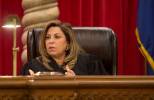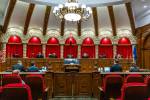Ethics in Nevada saved by the U.S. Supreme Court
The Nevada Commission on Ethics came very close to death Monday, or at least the bureaucratic equivalent of it.
But it got a reprieve -- and even a strong affirmation -- from the U.S. Supreme Court, which upheld a key section of the ethics in government law.
It all started in 2005, when the commission found Sparks City Councilman Michael Carrigan acted unethically when he cast a vote in favor of the Lazy 8 hotel-casino project, for which Carrigan's friend and old campaign manager, Carlos Vasquez, was a paid consultant.
Nevada law forbids public employees or officers from voting on matters when they would be reasonably affected by a commitment in a private capacity to the interests of others. According to the law, that means wives, children, family members, employers, business partners and " ... any other commitment or relationship that is substantially similar ... ."
It was that latter line the commission used to accuse Carrigan. He sued, claiming the law was vague and that his right to free speech would be violated if the panel stopped him from voting.
In other words, Carrigan argued he had a First Amendment right to use his office to help his friend and ex-campaign manager -- who helped him win the office in the first place. Only in Nevada.
A District Court judge upheld the Ethics Commission's judgment, but the Nevada Supreme Court -- which has not been kind to the commission or the ethics in government law in the past -- overturned the ruling. The commission, knowing that the loss of that provision would severely hinder its ability to police ethical conduct in the state, appealed to the U.S. Supreme Court.
On Monday, the justices handed down a unanimous decision: The Nevada law is constitutional; Carrigan has no First Amendment right to behave unethically.
Justice Antonin Scalia, reading for the majority, noted that laws requiring recusal are as old as the Constitution itself, and that they even pre-date the Bill of Rights. Members of the House of Representatives apparently didn't see any conflict between their internal rule -- "no member shall vote on any question, in the event of which he is immediately and particularly interested" -- and the First Amendment they would later adopt in 1791.
Not only that, but there's a paucity of decisions to be found striking down laws that require abstention for ethical reasons. "The Nevada Supreme Court and Carrigan have not cited a single decision invalidating a generally applicable conflict-of-interest recusal rule -- and such rules have been commonplace for over 200 years," the decision reads.
The high court made quick work of the free speech issue, saying the act of voting is not protected First Amendment expression, but the discharge of a government function. "The legislative power thus committed is not personal to the legislator but belongs to the people; the legislator has no personal right to it," the ruling reads. "The legislator casts his vote 'as trustee for his constituents, not as a prerogative of personal power.' "
The ruling should come as a relief to all Nevadans: Had the U.S. Supreme Court agreed with the Nevada Supreme Court, a key pillar of public ethics would have been demolished, and local lawmakers would have been free to dole out favors for business associates and campaign consultants at will.
However, under a separate ruling, the state Supreme Court has declared that the executive branch Ethics Commission has no power to police core legislative conduct -- i.e. voting -- under the inconsistently applied "separation of powers" doctrine.
The case now goes back to the Nevada Supreme Court, which could lead to more mischief. But in Nevada, ethical victories are rare and should be cherished.
Steve Sebelius is a Review-Journal political columnist and author of the blog SlashPolitics.com. Follow him on Twitter at www.Twitter.com/SteveSebelius or reach him at 387-5276 or by email at ssebelius@ reviewjournal.com.























